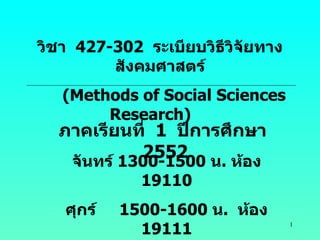
4273029652[1]
- 1. วิชา 427-302 ระเบียบวิธีวิจัยทางสังคมศาสตร์ (Methods of Social Sciences Research) ภาคเรียนที่ 1 ปีการศึกษา 2552 จันทร์ 1300-1500 น . ห้อง 19110 ศุกร์ 1500-1600 น . ห้อง 19111
- 2. คำอธิบายรายวิชา แนวทาง การอธิบายและระเบียบวิธีวิจัยทางสังคม ขั้นตอนของการวิจัย เริ่มตั้งแต่การเลือกหัวข้อการกำหนดปัญหาการวิจัย กรอบแนวความคิด การตั้งสมมติฐาน การออกแบบการวิจัย การเก็บข้อมูล การวิเคราะห์ข้อมูล การตีความผลการวิเคราะห์ การเขียนรายงานการวิจัย การเขียนโครงร่างการวิจัย
- 3. กระบวนการเรียนการสอน ก . วัตถุประสงค์ : เมื่อได้ศึกษาวิชานี้แล้ว นักศึกษามีความรู้ ความเข้าใจ ระเบียบวิธีวิจัยทางสังคมศาสตร์ ( ในระดับต้น ) สามารถเขียนโครงร่างการวิจัย และวิเคราะห์ข้อมูล ( ในเชิงอธิบายระดับต้น ) ได้
- 4. ประสบการณ์การเรียนรู้ ( หัวข้อ ) 1. การแสวงหาความรู้ของมนุษย์ 2. องค์ความรู้ของมนุษย์ (Body of knowledge)
- 5. ประสบการณ์การเรียนรู้ ( หัวข้อ ) 3. สังคมศาสตร์ : แนวทางการศึกษา - สังคมศาสตร์เชิงปฏิฐาน (Positivist Social Science) - สังคมศาสตร์เชิงตีความ (Interpretative Social Science) - สังคมศาสตร์เชิงวิพากษ์ (Critical Social Science)
- 6. ประสบการณ์การเรียนรู้ ( หัวข้อ ) 4. วิธีการทางวิทยาศาสตร์กับสังคมศาสตร์ 5. การจัดประเภทของการวิจัยทางสังคมศาสตร์ 6. ขั้นตอนและกระบวนการวิจัย
- 7. ประสบการณ์การเรียนรู้ ( หัวข้อ ) 7. การเลือกหัวข้อและสร้างปัญหาการวิจัย - ประเภทของปัญหาการวิจัย - องค์ประกอบของปัญหาการวิจัย
- 8. ประสบการณ์การเรียนรู้ ( หัวข้อ ) 8. การสำรวจองค์ความรู้ การตรวจสอบวรรณกรรมที่เกี่ยวข้อง (Review of related Literature)
- 9. ประสบการณ์การเรียนรู้ ( หัวข้อ ) 9. การแสดงกรอบแนวความคิดในการวิจัย (Conceptual Frame) - กระบวนการย่อยแนวความคิด (Conceptualization) - นิยามเชิงแนวคิด (Conceptual Definition) - ตัวแปรในการวิจัย - นิยามเพื่อการวัด (Operational Definition) - การวัดในการวิจัยเชิงปริมาณ (Quantitative Measurement)
- 10. ประสบการณ์การเรียนรู้ ( หัวข้อ ) 10. สมมติฐานการวิจัย (Research Hypothesis) 11. การออกแบบวิจัย 12. ข้อมูลและการเก็บข้อมูล 13. การวิเคราะห์ข้อมูล
- 11. ประสบการณ์การเรียนรู้ ( หัวข้อ ) 14. การตีความ สรุปผล 15. การเขียนและเสนอรายงานการวิจัย 16. การเขียนเค้าโครงการวิจัย
- 12. The Research Process Writing a research report Processing data Collecting data Writing a research proposal Selecting a sample Constructing an instrument for data collection Conceptualising a research design Formulating a research problem
- 13. The Research Process Writing a research report Processing data Collecting data Writing a research proposal Selecting a sample Constructing an instrument for data collection Conceptualising a research design Formulating a research problem Step I Step VI Step V Step IV Step III Step II Step VIII Step VII 1.Reviewing the literature 2.Formulating a research problem 3.Identifying variables 4.Constructing hypotheses 7.Selecting a method of data collection 8.Establishing the validity and reliability of research instrument 9. Steps in collecting data 11.Writing a research proposal 13.Processing data 14.Displaying data 5.The research design 6.Selecting a study design 10.Sampling 12.Considering ethical issues in data collection 15.Writing a research report
- 14. The Research Process Writing a research report Processing data Collecting data Writing a research proposal Selecting a sample Constructing an instrument for data collection Conceptualising a research design Formulating a research problem Consideration and steps in formulating a research problem Principle of scientific writing Methods of data processing:Use of computers and statistics Sampling theory and designs Methods and tools of data collection Research design:function Literature review Variables and hypotheses:definition and typology Study design Validity and reliability of the research tool Contents of the research proposal Field test of the research tool Editing of the data Developing a code book Coding Operational steps Required theoretical knowledge Required intermediary knowledge Conducting of the study What How
- 15. กระบวนการวิจัย Phenomena Theoretical concept Ideology Curiosity Identified the research problem Problematic variable
- 16. Problematic variable Hypothesis Variables Index , scale Population Sampling Sample Data
- 17. Instrument Collecting data Data edit Analysis Qualitative analysis Quantitative analysis Descriptive statistics Inferential statistics Interpretation Research report
- 18. Type of Research Type of information sought Application Objective Descriptive research Exploratory research Correlational research Explanatory research Quantitative research Qualitative research Pure research Applied research
- 20. ทฤษฎีกับการวิจัย Data Analysis Hypothesis Abstract theoretical structure Formulation of concepts and proposition High-level proposittion Generalization of empirical data Generalization of empirical data Data transformation Measurement Instrumentation Observation Inductive Deductive
- 24. Types of hypothesis Alternative hypothesis Hypothesis of difference Hypothesis of association Hypothesis of point-prevalence Research hypothesis Null hypothesis Null hypothesis
